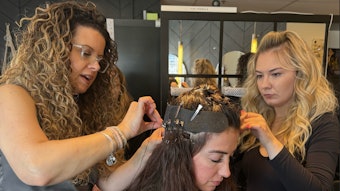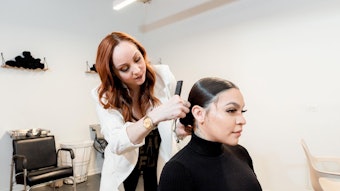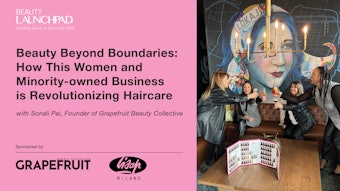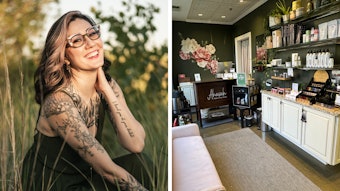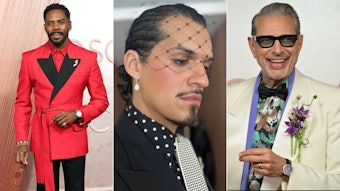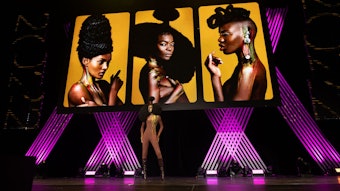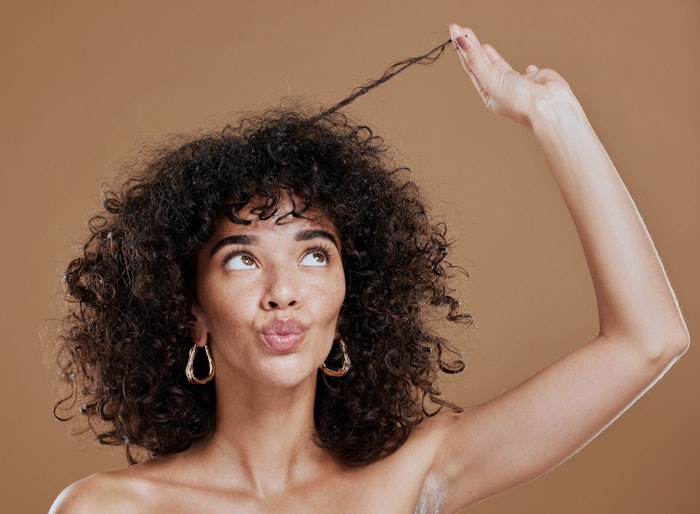
All hair types need moisture, but curly and coily hair types need extra. Moisturization for Type 3 and 4 hair types is at utmost importance, not only to have curls looking their best, but also to prevent frizziness and breakage. Visits to the salon for cuts and color are the perfect time for your curly clients to get a treatment without much added time. Not only can this add more money to your bottom line, but it can also ensure healthier hair for your clients. We went to two leading curl experts to weight in on treating curly hair and recommend their favorite curl products and tools.
Stylist, curl educator and "curl king" himself Ethan King emphasizes, "You would be shocked what a good treatment regimen can do for your curls! Bouncy, luscious and hydrated curls are only a treatment away! People always want the shiny, juicy envious curl, and it all starts with proper hair health." He continues, "Curly hair is already a naturally dry feeling fabric and needs proper balance of moisture and protein. I always recommend for all clients with curly hair to have a hydration treatment and a protein treatment. Curls need a balance of both, or they can become limp or brittle."
To have effective curly hair treatments in the salon, you need to make sure you have the right tools and know-how in your arsenal. This article breaks down the most successful tools for effective curl treatment and the top ingredients for curl treatment. Employ these in your salon, and your curly haired clients will be clients for life.
1. Water
It seems so basic and probably redundant, but we cannot stress enough how important water is to the treatment and styling of curls. Most curl specialists will agree that water should always be used in both curl treatments and curl styling. Although curls are not one size fits all, curly hair tends to lack moisture and be prone to moisture loss and breakage. Of course, the ability for hair to absorb and retain moisture is impacted largely by its porosity, which varies from individual to individual. In general, curly hair is often more porous than straight hair and coily hair is the most porous. So, the goal in curly hair styling and treatment is to add moisture to the hair and keep it in.
Styling curls and coils requires the application of water to the hair before the styling product to moisturize the hair while giving it shape and definition.
Similarly, hair treatment should always involve the application of water before the hair is treated. This water helps to hydrate the hair before the treatment locks the moisture in. Water helps to raise the cuticle of the hair so that the conditioning treatment works better and is better absorbed. Stylist and curl specialist Chloe Hartnett adds, "Curly hair naturally has a raised cuticle, which easily allows for moisture to be released from the hair as well as its lack of ability to retain moisture. Therefore, it’s imperative for curls to receive at-home and salon treatments."
2. Protein
The entire human body is made up of protein, including hair. The protein keratin makes up the bulk of the hair, and keratin is composed itself of amino acids. Protein gives structure to the hair, therein providing shape and strength to the hair. So, when protein is in short supply, hair lacks structure and is prone to breakage. For curly hair, lack of structure results in curls that do not hold their shape.
Chemical treatments, heat styling, hair color and more can all affect the protein content of hair and result in damage. Adding protein back to all hair types is important, but especially important to curls to help them hold that beautiful spring that we all envy.
"My top two favorite treatments for my curly clients are the Ouidad Curl Restoration Therapy Deep treatment (formerly Ouidad’s 12 minute deep treatment) and the Iles Formula Hair Mask," Hartnett notes. "Ouidad's Curl Restoration Mask is my go to for bouncy rejuvenated curls. This product penetrates deep into the cuticle and replaces the 14 amino acids and proteins that are essential for curl formation. The Iles Formula Hair Mask is an amazing raw option to make the hair feel like silk.".
3. Moisturization
When it comes to hydration, there is nothing that can beat water, though a few ingredients come close, but moisturization is a different animal. Sebum produced in the follicle has an easier time traveling down straight hair than curly hair, leading curly and coily hair to be drier. There are a number of ingredients that can provide moisture to curly and coily hair, and choosing the right ones is paramount. Some examples include lightweight oils such as argan, sunflower and jojoba, aloe vera and shea butter. Heavier oils such as coconut can be used on very dry and coarse hair. See our sidebar Top Ingredients for Curly Hair Treatment for a more complete list of curly hair moisturizers.
Top Ingredients for Curly Hair Treatment
Silk Amino Acids: These proteins from silk help replace the proteins lost from chemical, color and heat styling damage.
Vitamin B5: Also known as panthenol, B5 is a hair moisturizer and helps it retain moisture to prevent breakage and frizziness. It also adds shine and can help regulate oil in the scalp.
Shea Butter: This natural moisturizer adds hydration to dry hair. It also detangles and smooths curly hair.
Jojoba oil: Jojoba oil is known to be a great moisturizer for curly hair. It also helps curly hair retain moisture, and it can protect hair from future damage. Jojoba can also help alleviate a dry scalp.
Argan oil: Like jojoba, argan oil is a great moisturizer for curly hair. Similarly, it helps curly stands retain their moisture and adds shine.
Coconut oil: Coconut oil is an effective moisturizer but can tend to be on the heavier side. It is mostly beneficial for very dry or course curls.
Sulfur: Especially helpful for dry, damaged hair, sulfur helps to strengthen hair. As a key component of keratin, sulfur also improves hair elasticity. It is also said to promote hair growth.
Aloe: Aloe helps to moisturize and lock moisture into curly hair. It also adds shine to hair.
Sunflower oil: This oils provides lightweight moisture to the hair without weighing curls down. The essential fatty acids in sunflower help hair maintain moisture, while the vitamin E protects the hair.
4. Heat
Incorporating a heat element to deep conditioning treatments for curls can be beneficial, but it must be done with care to help and not hurt the process. Many curl experts will employ a heat element such as steam to help treatments absorb. This heat helps to open the cuticle of hair, allowing the conditioning ingredients to work better. It also improves product penetration and absorption, resulting in longer-lasting results.
"A crucial component is leaving these treatments on long enough with a proper heat source. Without a heat source, treatments will not be able to penetrate the cuticle well enough; therefore, there will be a lack of results. I also recommend leaving these treatments on between 15-20 minutes," adds Hartnett.
Like with all things, too much of a good thing can go wrong. Heat benefits hair with low porosity the most, whereas hair with high porosity is already prone to higher absorption. Too high heat or heat used too long can end up drying the hair, effectively negating the effect of the conditioning treatment. To much heat can also increase hair porosity, making it prone to breakage and damage. Low heat options are recommended when heat is incorporated into conditioning treatments such as a warm towel, steamer, heated cap or hooded dryer.
5. The Right Tools
Having the right tools in your arsenal when treating your curly hair clients is essential. One of the top tools that most curly hair specialists will recommend is a detangling brush or comb. Many will recommend a wide-tooth comb, though some will also go for a detangling brush. King shares, "I always recommend using a good detangling brush to help distribute the product in sections, a heat source, a plastic shower cap and sometimes a steamer to open the hair up and allow for deeper penetration of product."
Hartnett adds, "With treatments, you really don’t need many tools to get the job done. I really like using a wide tooth comb/brush to evenly distribute my treatment through the hair. Without combing your mask through, you will only be getting your product on about 40% of the hair."
6. Compliance
Most curl specialists will agree that compliance is an important factor with home curl treatment. King explains, "Treatments are good for all hair types and all textures and it is something most people neglect at home." For this reason, stylists will recommend that clients either do a combination of at-home and salon treatments or rely on salon treatments alone.
King adds, "Honestly, I always recommend treatments in salon because you usually need them by the time you come back. There is always some sort of treatment that you can benefit from. Let’s get serious, none of us are perfect! At home, I typically recommend every other week if your hair is in a healthy state and every week if your hair is deprived of something and not at its best."
Hartnett recommends curl treatments at home every 2-4 weeks and in salon treatments with every curly cut appointment.
Professional curl treatments are often more successful than at-home versions for reasons of product accessibility, better application and tool utilization. "In salon treatments are usually more intense and applied more thoroughly with heat or steam involved," King explains. "As professionals, we have access to treatments that consumers do not have access to. Now, some treatments used at backbar in the salon are sometimes able to be purchased as a retail item in your salon."
About Our Experts
Chloe Hartnett (@curls.by.chloe) is a curl specialist, texture extension artist and stylist at Adored Salon in Lombard, Illinois. Her love for hair began at the early age of 11, and after education at Paul Mitchell, she began working at Adored Salon as an assistant.
Ethan King (@slickback_buttahtoast) is a curl educator, Goldwell national artist and is a co-owner and stylist at Ron King Salon in Austin. He is known as "The Curl King," for him immense knowledge and contribution to education on curly hair.

